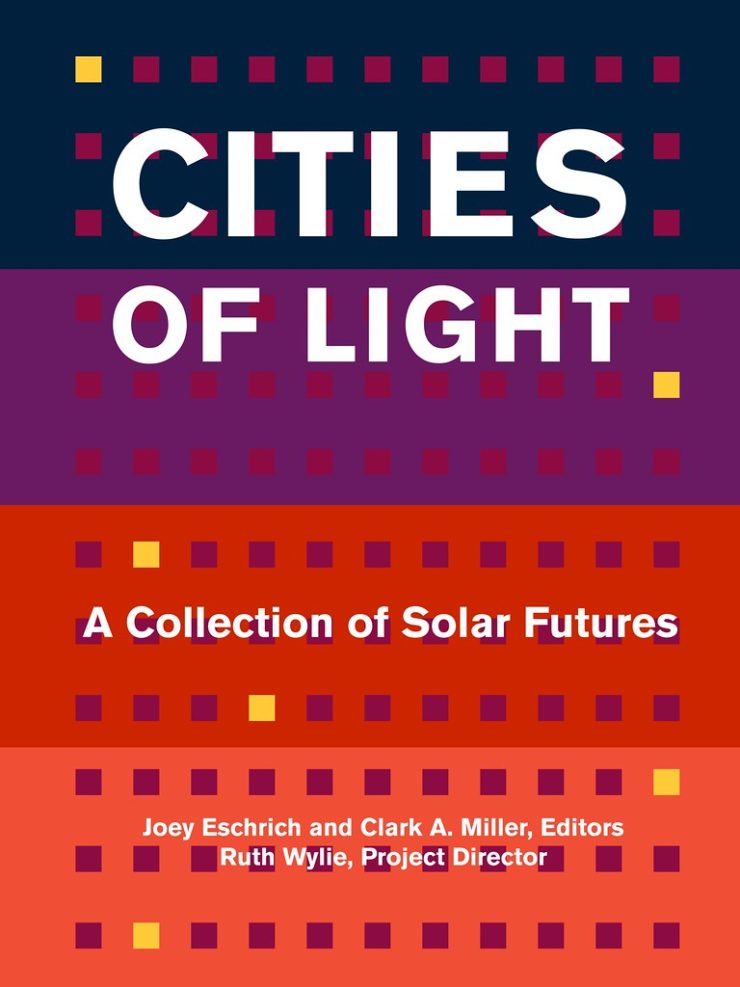For several years now, Arizona State University’s Center for Science and the Imagination has been exploring the intersection between science and science fiction, using stories as a way to imagine what a plausible future might look like. It releases a regular series of short stories through “Future Tense”, its partnership with Slate, and over the years has released a handful of short themed anthologies covering everything from space flight to solar power.
The center released a new anthology this week, Cities of Light: A Collection of Solar Futures, which includes short stories from Paolo Bacigalupi, S.B. Divya, Deji Bryce Olukotun, Andrew Dana Hudson, along with supporting, nonfiction essays.
The anthology is free online: you can get it in a variety of formats (there’s also a print on demand option), or simply read it online. It’s an accompaniment of sorts to an earlier anthology that the center released back in 2019: Weight of Light, A Collection of Solar Futures (which featured stories by Brenda Cooper, Andrew Dana Hudson, Cat Rambo, and Corey S. Pressman).
Like that previous book, Cities of Light‘s content focuses extensively on the intersection of two things: the impending climate disaster and the role that cities might play in developing some solutions. In his introduction, editor Joey Eschrich notes that the center held a narrative hackathon event in conjunction with the US National Renewable Energy Laboratory in February 2020, which brought together engineers, political scientists, and science fiction authors to tackle the topic. “To imagine the post-carbon city thus requires inquiry into far more than the technologies that will power its diverse activities,” Eschrich writes.
“It requires an examination of what the elimination of greenhouse gas emissions from their lives will mean for the people who live in the cities of the future and walk, bicycle, and drive their boulevards and alleyways.”
To that end, this anthology is broken up into four parts, each focusing on a different city: Chicago, Illinois; Portland, Oregon; San Juan, Puerto Rico; and San Antonio, Texas. Each section gets its own short story (Paolo Bacigalupi, Andrew Dana Hudson, S.B. Divya, and Deji Bryce Olukotun, respectively), as well as a handful of essays (some set in the world of the story), as well as some accompanying artwork.
Bacigalupi’s story “Efficiency,” is set in a future where we store kinetic energy for power, in this case, with giant weights moving up and down some of Chicago’s giant skyscrapers, and follows one worker who works high above the ground to keep it operating at peak efficiency alongside an ambitious artificial intelligence.
Hudson’s Portland-set story “Solarshades” is a neat, cyberpunkish take on wealth inequalities as a pair of kids get their hands on a government official’s augmented reality glasses and the data they display. (This one reminded me a bit of Octavia Butler’s Parable of the Sower.)
We head over to Puerto Rico in S.B. Divya’s story “Things That Bend, But Don’t Break,” about a young woman with a promising future off the island, who runs into issues after coming up with a novel energy storage technology from unseen folks who left the island years ago.
And finally, Olukotun takes us to San Antonio, Texas in “The Scent of the Freetails,” about a family who visits a new, technological community and observes quite a few differences from their own home.
It’s clear from each of the stories that there’s a lot ticking in the background, the results of the in-person hackathon that helped inspire the book. Each story is brimming with ideas — new technologies, economics, societal norms, and racial relations, showing off a potential future that feels like it’s just within reach. Maybe, the anthology will help inspire some budding engineer or policy official, and inspire some meaningful change for our collective futures.










